
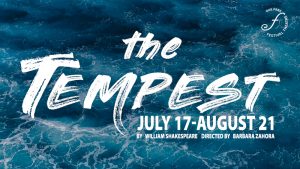 Recommended *** An outdoor audience swelled Austin Gardens, in downtown Oak Park, to watch Shakespeare’s “The Tempest”, the first significant show in the Chicago area to return live onstage since the end of COVID restrictions. Presented by the Oak Park Festival Theatre and directed by Barbara Zahora, this iteration of Shakespeare’s classic tale took place on a lovely summer’s evening with the cicadas chirping to their hearts’ content, only to be replaced by the sounds of distant firecrackers after sunset. Everybody associated with the production kept thanking the audience for sticking with them during fallow times; and we in the audience were all so delighted to be there! This kumbaya moment was reminiscent of seeing old friends at a school reunion and wondering where all the time had gone. What a perfect climate for watching a performance about the uneasy connection between magic and science, the fanciful and the rational, where spirits are real and the future remains enigmatic.
Recommended *** An outdoor audience swelled Austin Gardens, in downtown Oak Park, to watch Shakespeare’s “The Tempest”, the first significant show in the Chicago area to return live onstage since the end of COVID restrictions. Presented by the Oak Park Festival Theatre and directed by Barbara Zahora, this iteration of Shakespeare’s classic tale took place on a lovely summer’s evening with the cicadas chirping to their hearts’ content, only to be replaced by the sounds of distant firecrackers after sunset. Everybody associated with the production kept thanking the audience for sticking with them during fallow times; and we in the audience were all so delighted to be there! This kumbaya moment was reminiscent of seeing old friends at a school reunion and wondering where all the time had gone. What a perfect climate for watching a performance about the uneasy connection between magic and science, the fanciful and the rational, where spirits are real and the future remains enigmatic.
Each one of the excellent cast members makes Shakespearean English roll off the tongue as if it were being spoken on a daily basis. Two performers especially stand out in this show: Bernell Lassai, who plays Ariel, and Kevin Theis, who plays Prospero. Lassai beguiles us with his emphatic acting and beautiful singing voice and especially with the tone and tambre of his spoken voice. His movements are refined and glorious. Theis dominates the stage with his strong body language, fine acting, and commanding presence, which elegantly hold the show together. The supporting actors are likewise stellar and include: Jeannie Affelder (Antonia), Belinda Bremner (Gonzalo), Dakotah Brown (Master of Ship/Francisco/Spirit), Tony Bozzuto (Sebastian), Matt Gall (Caliban), Noelle Klyce (Alonsa), Orion Lay-Sleeper (Stephano), Savanna Rae (Trinculo), Deanalis Resto (Miranda), Emma Sipora Tyler (Boatswain/Adrian/Spirit), and Austyn Williamson (Ferdinand).
Thanks to scenic designer Ryan Fox, we are treated to a set that combines a sailing ship in turmoil, a railroad shipping container, and a warehouse building; these all provide an early 20th century material backdrop to a show where the spirit world often reigns and where benevolence and malevolence meet up with human circumstance. Costumes bring together the old and the new: 16th century overlays over modern men’s underwear, work clothing from the 17th through 19th centuries, and women’s dresswear from the early 20th century are just a few examples. My favorites, though, were the garments worn by Ariel: his coat of many colors and his wings, plus the Duke’s finery. The montage of contrasts is nicely accomplished by costume designer Rachel M. Sypniewski.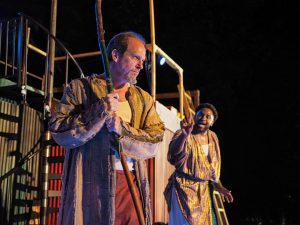
With the frightful rainstorm only a small part of Shakespeare’s first act, the rest of the action takes place once the castaways have landed on a mysterious island. The inspiration for this fictional place might have been the Athenian ideal of Atlantis, which has been a theme in great literature throughout the ages. Largely beginning with Plato’s Republic, the existence of a now-sunken land is thought to portend the “discovery” of a new continent. But in later years, this secret locale was supposedly in the area of the Bermuda Triangle, where many sailors have believed that something preternatural exists. Why have people over the centuries disappeared in the midst of the Atlantic Ocean for no apparent reason? Whether real or metaphorical, this arcane island, now having risen from the ocean deep, has made its way into Shakespeare’s “The Tempest.”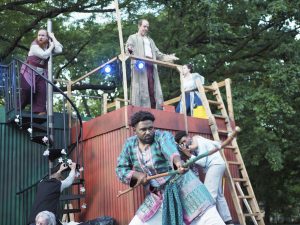
Ideas about the meaning of freedom and bondage pervade most of the play. When Prospero liberates Ariel from imprisonment by the evil Sycorax, the air spirit becomes indebted to him. Ariel shows his gratitude by allowing Prospero to control how and when he casts his magic spells. Eventually, however, Ariel becomes a “free spirit” when Prospero releases him from his service. Then too, there is Caliban, the only native to the island who was supposedly the offspring of a devil and a witch; such a thought might have occurred to European sailors of that era who had encountered indigenous peoples in the New World and had likely sought excuses to dominate and enslave them.* Caliban’s release from involuntary servitude by Prospero is yet another form of liberation: this time from physical labor. Then there is Prospero’s daughter Miranda, who is like Caliban in that she has been isolated (read “sheltered”) from humanity at large. We see her gradually become liberated: first in the sense that she meets more people, each with different personalities (“O brave new world, that has such people in it!”) and then in her transition from childhood to adulthood. Her complete liberation comes in her marriage to Ferdinand, where she makes the choice to pursue him. In the end, the most liberating act is when Prospero renounces sorcery in favor of science and rationality. When his generosity of spirit prevails over his desire to manipulate others and impose his will on them, he becomes the royal personage he needs to be. We learn from Shakespeare that goodness and true power are demonstrated by allowing people the freedom to live in accordance with their wishes and their nature.
The only thing that was not so delightful about the evening’s performance was the restroom situation. In 2019, we were able to use the restrooms inside the fieldhouse as well as those located outdoors. This time around, however, the building’s interior was limited to cast and crew, and the long lines during the intermission meant that the second half had to be held up significantly. With COVID restrictions now lifted, outdoor chairs were being placed everywhere on the circumscribed portion of lawn without a middle aisle to get from the front to the back of the outdoor space. The lack of an aisle may have also led to additional minutes for audience members to travel to and from the restrooms.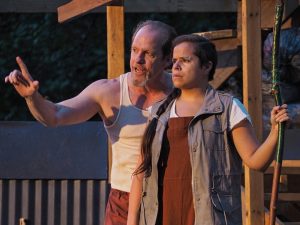
We are currently living in a moment in time when most people in the Chicago area are taking the coronavirus situation seriously, and I assumed that most, if not all, of the people in the audience were vaccinated. Therefore, I wasn’t worried about the closeness of the seating or the decision (based on State metrics and CDC guidelines) not to wear masks. That said, I don’t want us to return to the period in Shakespeare’s life in 1592-93 when the plague was supposedly over and the theatres in London opened up too soon; these subsequently had to be closed down by the Crown for a second time. So let us take our cue from the inimitable bard, who lived through the various pandemics of his day and made his lead character in “The Tempest” forswear the use of magic. Let us embrace scientific progress, conclude that magical thinking won’t save us, and work hard to free ourselves from Ariel’s deceptions.
 “The Tempest” is currently being performed live outdoors from July 17 through August 21, 2021, at Austin Gardens, 167 Forest Avenue, Oak Park, Illinois.
“The Tempest” is currently being performed live outdoors from July 17 through August 21, 2021, at Austin Gardens, 167 Forest Avenue, Oak Park, Illinois.
Showtimes are:
8:00 p.m. Thursday – Saturday
7:00 p.m. Sunday
General admission tickets are $35.
Senior and student discounts and group sales are available.
Children under 12 are free.
For tickets, please go to: https://oakparkfestival.com/tempest/.
Ample parking is available in a parking garage across the street on Forest Avenue, just south of Ontario Street.
For more information about “The Tempest”, please go to the preview page: https://oakparkfestival.com/tempestprgm/#.
To learn more about the Oak Park Festival Theatre and their offerings, visit https://oakparkfestival.com/.
“Your charitable gift… allows us to produce timeless and relevant works of art while deepening our impact in the community.” Please see their website for more details on how you can contribute to dynamic community theatre: https://oakparkfestival.com/donate/.
https://oakparkfestival.com/donate/.
*Note that the Jamestown colony was founded in 1607; the first African slaves were brought there in 1619; and “The Tempest” was written in 1621. So slavery was definitely on the minds of the Londoners of the day. However, the institution already existed since Columbus’s second voyage (1493-96) when he began subjugating Native American captives from the various islands. Hence the name Caliban can be considered a derivative of the name Caribbean, the place where European colonization and the modern history of slavery began.
To see what others are saying, visit www.theatreinchicago.com, go to Review Round-Up and click at “The Tempest”.


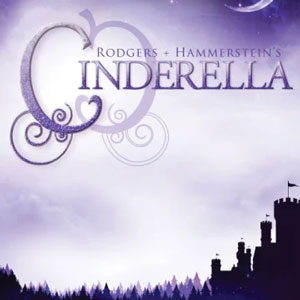



More Stories
“Rodgers and Hammerstein’s Cinderella”
“Don’t Let The Pigeon Drive The Bus”
” The Hip Hop Nutcracker” reviewed by Amy Menzel